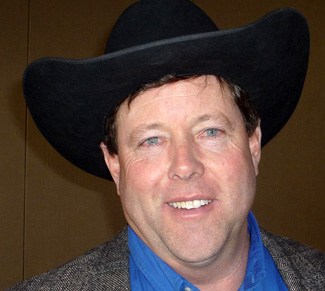
Sandy Jones (Photo by Peter St. Cyr)
‘We’ve sold off more of the trust than we need to,’ Sandy Jones says. ‘We need to preserve the land.’
Sandy Jones, the chairman of the state’s Public Regulation Commission, says running for commissioner of public lands makes perfect sense. In September, when he announced his candidacy in Belen, he called it a “natural leap for a tough regulator.”
He and several other candidates vying for the office in 2010 will be attending an hour-long forum sponsored by the New Mexico Cattle Growers’ Association this afternoon at the Albuquerque Pyramid Hotel beginning at 1:30 p.m.
Jones, who said his 28 years of construction and farming experience makes him a serious contender to replace Pat Lyons, recently sat down with NMPolitics.net to talk about his vision for the office.
“The next guy has to be business savvy. He’s got to be tough on enforcement and he’s got to be a guy who can balance a lot of interests,” the Democrat told NMPolitics.net.
With public education being cut by lawmakers, Jones knows “there’s tremendous pressure on the land office.”
” We’re going to have to step up and figure out how to maximize revenues for education,” he said.
He’s already picked up his first endorsement from the The New Mexico Building and Construction Trades Council.
While Jones said he recognizes the value of providing land to renewable energy companies, he doesn’t think lawmakers and environmentalists should be running oil and gas companies off to Texas.
“We’re going to move to renewable, but it’s going to take us time to get there,” Jones said. “To say we’ll quit pumping oil and replace it with wind or solar is not a fair analogy. It’s not going to happen right away. We have to be realists.”
He also opposes an idea being floated by some lawmakers to tap the state’s permanent fund to cover revenue shortfalls.
[youtube]http://www.youtube.com/watch?v=Fkxp-90jhQI[/youtube]
Exit strategies
Jones wants the land office to help renewable energy companies move to New Mexico, but says each company needs to be properly vetted before getting a land deal.
“We need to make sure they have the ability to do these projects,” Jones said. “Just leasing ground to a speculator isn’t my idea of moving the renewable industry forward.”
Jones wants every lease contract to have an exit strategy, in case a renewable project “goes south.”
“If it fails, who’s going to clean it up?” Jones asked. “We need to make sure there is a bond in place to clean it up and start asking questions about the ecological issues. We’re still cleaning up mines from an era when people thought mining was the greatest thing in the world. Now we’re cleaning up all their toxic waste.”
With windmill and solar farms estimated to cost $500 million or more to build, Jones said clean up could be expensive. He said as land commissioner he’ll take a hard look at every contract before offering up state lands.
He also said he has the foresight to get a premium on every renewable company lease.
“The guy who’s going to negotiate these contracts needs to know where those projects best fit. It’s about location. I know where the transmission is. I know how to maximize those leases,” he said.
‘The devil is in the details’
Pointing to a controversial four-way land exchange at White Peaks in Northern New Mexico, Jones told NMPolitics.net he favors appointing an advisory board to guide his decisions rather than the Legislature creating more oversight of the state land office.
He hopes an advisory board of “good strong people” will be his eyes and ears. He said having legislative hearings for every land deal could bog down the system for months, which could send send prospective projects to neighboring states.
“I’m OK with the state’s Constitution granting the commissioner of public lands the authority to make decision on land deals,” Jones said. “But, after 100 years of tradition we’ve come to a crossroad, and maybe the land commissioner should put together a bipartisan group, a cross-section of industry representatives, sportsmen and conservationists.”
“My biggest concern on White Peak is we’re dealing with a company that forced sportsman to go all the way to New Mexico Supreme Court when they were trying to control access to the land. That sends a red flag up for me,” Jones, a hunter himself, said. “That’s why we need to make sure all the parties are together before we fire off these deals. We’ll bring a lot of folks together to find solutions on big issues.”
Jones said he would have handled the White Peaks exchange differently than Lyons — with an open bid process.
“I’ll protect the public interest, maximize revenue to education beneficiaries and keep traditional access to the public open,” he said. “The devil is in the details.”
He wants to know why Lyons is only getting 10 percent above the appraised value for the land swap at White Peaks.
“What if we can get 40 percent or 50 percent for the prime hunting land at White Peaks?” Jones asked.
Jones, like Lyons, wants to square up checkerboarding land issues across the state and make state trust land more contiguous, but he said “every exchange better have clear benefits to the state’s beneficiaries.”
Jones faces Santa Fe Commissioners Harry Montoya and Mike Anaya and former Land Commissioner Ray Powell in the Democratic primary. On the Republican side, GOP activist Bob Cornelius, retired law-enforcement agent Errol Chavez and rancher Matt Rush are running.
Lyons, who is running for a seat on the public regulation commission next year after being term limited from seeking re-election as land commissioner.
St. Cyr is a contributing writer for this site and a reporter at 770KKOB.com. He can be reached at peter.stcyr@gmail.com.